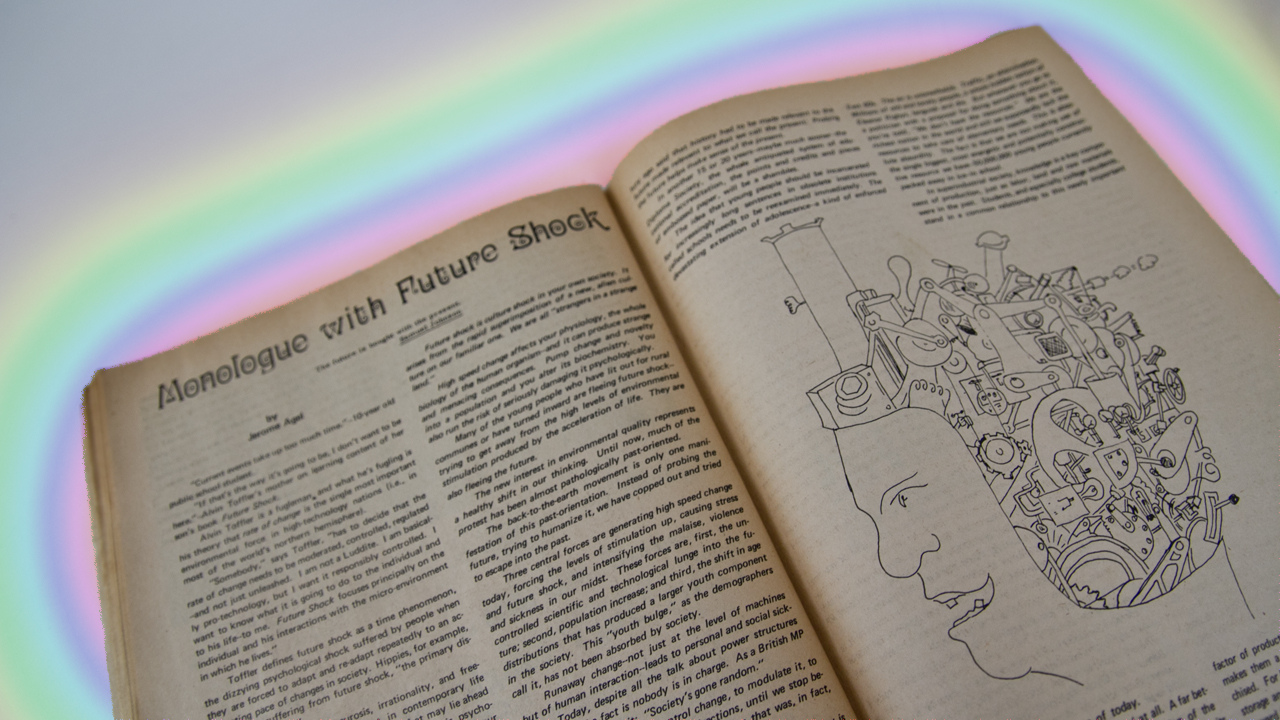ANIMAL’s Radicals Of Retrofuturism uncovers stories by the technological rebels of the past in vintage media and looks at their predictions in the context of today’s digital world. This week, we look at Alvin Toffler’s “Future Shock” in the Realist and beyond, circa 1970.
Alvin Toffler‘s Future Shock, unlike the other bits of futurist ephemera we’ve discussed so far in this column, was a genuine cultural phenomena. Released in 1970, his book became an international bestseller, eventually going on to sell over six million copies. Toffler’s concept was simple: in the world of the early ’70s, the “rate of change” was outpacing humans ability to adapt to it. This is what he referred to as “future shock.” He considered it a “psychological disease,” the treatment of which was vital for our society.
His influence was far reaching, inspiring everything from a Magic: The Gathering deck to a TV On The Radio song. In 2011, the Polish Unsound Music Festival even took “future shock” as its theme. Soon after the book’s release, a documentary version was produced, which largely faded into obscurity. In the film, which is available to watch on YouTube, Orson Welles ominously presides over a very ’70s depiction of “the future,” where he appears as a kind of futurist James Bond. It’s recommended viewing for the vintage computer footage alone.
In a 1971 issue of underground publication The Realist, author Jerome Agel introduces a monologue from Toffler about his work. Agel went on to publish over 40 books, and was involved with a multimedia collaboration with Marshal McLuhan titled The Medium Is The Massage and a rare, out of print behind-the-scenes look at 2001: A Space Odyssey.

In The Realist, Toffler gives an overview of his concept, criticizing the hippie establishment of the day. He believed that engagement with “the future” was essential for ensuring we would adapt to rapid societal changes, avoiding future shock. He disapproved of the “pathologically past-oriented” countercultural ideas of the time like the back-to-the-land movement, writing that “instead of probing the future, trying to humanize it, we have copped out and tried to escape into the past.” He foreshadowed our cultural obsession with nostalgia, addressed in Simon Reynolds 2011 book Retromania. Toffler was also deeply critical of the educational system, which he believed functioned on the “prime assumption [that] the world of tomorrow will resemble the world of today.”
In media theorist Douglas Rushkoff‘s most recent book Present Shock, he updates Toffler’s concepts. “If the end of the 20th century can be characterized by futurism, the twenty-first can be defined by presentism,” he writes in the book’s preface. His thesis is that today, due to the dominance of the internet and mobile technology, we have lost our sense of direction and narrative, instead living in a continual, disoriented present. Present Shock uses everything from the TV show Community to our cultural obsession with the apocalypse to demonstrate how desperate we are for anything to impose a narrative on our endless “now.”
One of Rushkoff’s central arguments is that we have allowed ourselves to be controlled by technology that was purportedly invented to make our lives easier. Workers in digital industries are expected to check their email 24 hours a day, to be “always on.” “We want all access, all the time, to everything – and to be capable of matching this intensity and availability ourselves,” he writes. “Instead of demanding that our technologies conform to ourselves and our own innate rhythms, we strive to become more compatible with our technologies and the new cultural norms their timelessness implies.” In Clay Shirkey‘s book Cognitive Surplus, he posits that the era of hyper-fast computing allows us more time to do things that are beneficial for all of humanity. But Rushkoff doesn’t see that becoming a reality if things keep going the way they have been.
Toffler said in a 1994 interview, “we are moving into an era in which we are going to explode existing cultures.” But though Future Shock discussed the impact this would have in the realm of social sciences, he admitted it would have been useful if he had a better understanding of economics. “If you think that economists are arrogant now, in the Sixties they were really riding high,” he said. “They claimed we would never have another recession, and the reason was that we understand how the economy works.” We are still recovering from our recent recession, and though the economy has regained most of the lost jobs, what replaced them is largely part time,temporary or contract based. We now treat employees the way we treat data, prioritizing efficiency and discarding those who can’t keep up.

Automation may end up putting the vast majority of people out of work in the next few decades, and the solution for this massive problem is up for debate. One idea is to train people for “higher level jobs,” although the reality may be that the robots can easily handle even those.
“We’re living in an economy where productivity is no longer the goal, employment is,” Douglas Rushkoff wrote in a 2011 column. He believes the time of proving our right to exist through labor is over. “We start by accepting that food and shelter are basic human rights. The work we do — the value we create — is for the rest of what we want: the stuff that makes life fun, meaningful, and purposeful.”
His idea may seem utopian, but some version of it may soon be an inescapable reality. If we take Toffler’s advice, conceptualizing possible futures like these is exactly what we should be doing. The future is coming, whether we are prepared or not.



